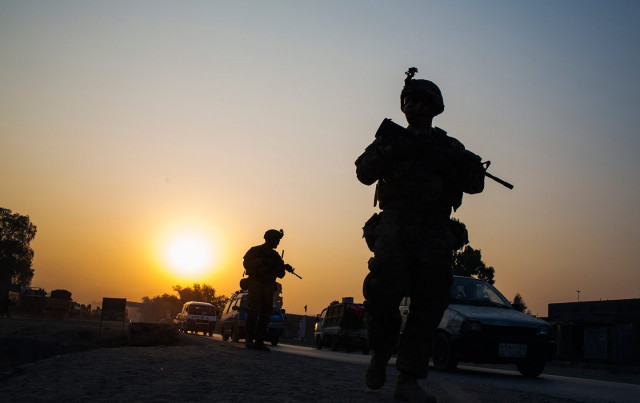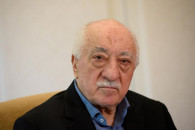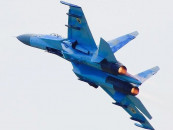When war wins
A harder war in Afghanistan spawned another parallel war in Pakistan, more intricate and difficult to overcome

A Reuters file photo
I celebrate the moment of peace that hopefully will usher in, even if briefly, through a peace deal between the US — which is ready to beat retreat post-haste from the wasteland that their presence of the last 20 years has turned Afghanistan into — and the Taliban. Two decades after 1979 had their proxies that had laid waste to what was known to the world as an important “buffer” between two warring alliances of the world. The Afghans will need to relearn peace from war now that the moment will bring in their control matters of their destiny. Hopefully, it won’t only be about the Durand Line or the Quetta Shura or the Taliban of this hue or another and how much influence and control does Pakistan have over any of them. Nor if the NDS, having lived and breathed a life of proxy wars against an assumed adversary in Pakistan, will continue to bring war and pain to Pakistan at someone else’s bidding. The way of the war must change, as should the structures which have sustained war to orient the society differently. We need to find peace; not re-find war.
America, the Taliban and Pakistan are all now tired of the Afghan war. The truth is that war overcame them. And nothing succeeds like war because when it does, peace is the only alternative. This peace in Afghanistan, when it eventually comes, is dedicated to the overwhelming sense of war which will always win if those that engage in it, don’t. The US was a foreign force but became its central determinant shedding both immeasurable blood and treasure to reach a futile end. Imperial hubris was already far beyond its sell-by date. America came into the region on impulse and is leaving on rational choice. It will be now for the Afghans to clean up behind them.
The Taliban fought out of conviction for their right to freedom from external control, and even as they persisted, in all fairness, they ran out of steam too and sought normalcy. So did Pakistan, retired by the exhaustion of uncertain geopolitical gains. There was enough on its own plate. Somewhere along the way, Pakistan found the truth to the uselessness of it all. We lost far too much in the bargain; even how an ordinary Afghan looked at us. Every war has its children and we will have to contend with them when hostilities cease. But the clean-up by the Afghans and the children of war will pose Afghanistan’s next frontier, too. Eventually, all will settle for it must and there isn’t more left to lose.
The next phase of the war may be even murkier. The roots of dissonance will lie in the fracture that now pervades the Afghan landscape. The usual spoils of war replaced with political handouts will pitch the likes of Ashraf Ghani and Abdullah Abdullah against each other including many more that will enter the fray. They shall have to decide between them a president in whose lap will then fall the next phase, holding the intra-Afghan dialogue peace within. The process will test out the commitment to peace of the Afghan elites who have captured the resources under the umbrella of the occupation forces of the last four decades and a bit longer. Negotiations will need to be re-learnt as Afghanistan shall have to find an equitable route to settle deep and multiple contradictions. Or it shall enter another phase of internecine war of obliteration, burn all down of what is left and rise from the ashes. Multiple factions and multiple warlords have evolved, each pursuing their own set of interests, who must find accommodation between themselves. It isn’t the case of the Taliban alone who shall have to settle with the rest.
The presidential elections were delayed so as not to ruffle the peace talks and to determine how Afghan Central may settle with the prospects of governance as a cooperative undertaking after the US leaves. Ghani did not wish to lose his centrality and played the spoiler when Trump first reached the moment of signing peace with the Taliban — his spoils of war. He got the chance and has reclaimed the presidency on the back of American support to find himself back in the middle of things when the Taliban come calling for peace (or their share of power) within. The US, in turn now, has delayed Ghani’s inauguration by two weeks to avoid upsetting the applecart of peace which they want done with, to move out.
This will bring us to the next deluge. First a president will be decided, then accepted, and then the Taliban will need to be acknowledged as relevant partners to the process of governance. The US will be in safer shores by then but the Afghans will have another sea to cross. If sense prevails, which should after having lost all — their dignity and their nationhood — they will sit and talk and relearn the art of give and take. If not, more blood will flow and more fire will consume of what is left. Pakistan has the fence to keep malice out but not everywhere and may end up receiving another influx of war refugees. This shall be Pakistan’s new frontier. The first wave over the last 40 years gave us narcotics, gun-running and lots of terror. This one may be even harder to contain in its menace.
A harder war in Afghanistan spawned another parallel war in Pakistan, more intricate and difficult to overcome. It left behind its own lot of children of war who pose as the next challenge. More war refugees from Afghanistan will only supplement trouble and complicate resolution; already trickier. Can another war be kept out of Afghanistan? The US has interestingly warned Iran to desist from disrupting peace. Hopefully India too will heed.
Ikk aur darya ka samna tha Munir mujh ko,
Mein ikk darya ke paar utra tou mein ne dekha
(There was another river for me to cross, Munir
I realised this after crossing the first one)
Published in The Express Tribune, March 1st, 2020.
Like Opinion & Editorial on Facebook, follow @ETOpEd on Twitter to receive all updates on all our daily pieces.



















COMMENTS
Comments are moderated and generally will be posted if they are on-topic and not abusive.
For more information, please see our Comments FAQ